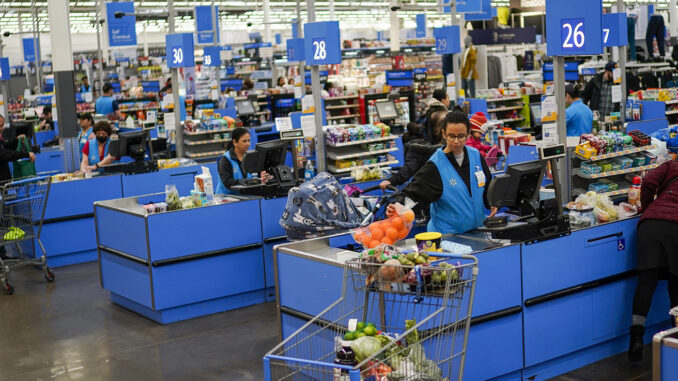
NEW YORK — Americans who spend Memorial Day scouting sales online and in stores may find more reasons to celebrate the return of warmer weather. Major retailers are stepping up discounts heading into the summer months, hoping to entice inflation-weary shoppers into opening their wallets.
Target, Walmart and other chains have rolled out price cuts — some permanent, others temporary — with the stated aim of giving their customers some relief. The reductions, which mostly involve groceries, are getting introduced as inflation showed its first sign of easing this year but not enough for consumers who are struggling to pay for basic necessities as well as rent and car insurance.
The latest quarterly earnings reported by Walmart, Macy’s and Ralph Lauren underscored that consumers have not stopped spending. But multiple CEOs, including the heads of McDonald’s, Starbucks and home improvement retailer Home Depot, have observed that people are becoming more price-conscious and choosy. They’re delaying purchases, focusing on store brands compared to typically more expensive national brands, and looking for deals.
“Retailers recognize that unless they pull out some stops on pricing, they are going to have difficulty holding on to the customers they got,” Neil Saunders, managing director of consulting and data analysis firm GlobalData, said. “The consumer really has had enough of inflation, and they’re starting to take action in terms of where they shop, how they shop, the amount they buy.”
While discounts are an everyday tool in retail, Saunders said these aggressive price cuts that cover thousands of items announced by several retailers represent a “major shift” in recent strategy. He noted most companies talked about price increases in the past two or three years, and the cut marks the first big “price war” since before inflation started taking hold.
Higher-income shoppers looking to save money have helped Walmart maintain strong sales in recent quarters. But earlier this month, the nation’s largest retailer expanded its price rollbacks — temporary discounts that can last a few months — to nearly 7,000 grocery items, a 45% increase. Items include a 28-ounce can of Bush’s baked beans marked down to $2.22, from $2.48, and a 24-pack of 12-ounce Diet Coke priced at $12.78 from $14.28.
Company executives said the Bentonville, Arkansas-based retailer is seeing more people eating at home versus eating out. Walmart believes its discounts will help the business over the remainder of the year.
“We’re going to lead on price, and we’re going to manage our (profit) margins, and we’re going to be the Walmart that we’ve always been,” CEO Doug McMillon told analysts earlier this month.
Not to be outdone by its closest competitor, Target last week cut prices on 1,500 items and said it planned to make price cuts on another 3,500 this summer. The initiative primarily applies to food, beverage and essential household items. For example, Clorox scented wipes that previously cost $5.79 are on shelves for $4.99. Huggies Baby Wipes, which were priced at $1.19, now cost 99 cents.
Low-cost supermarket chain Aldi said earlier this month that it was cutting prices on 250 products, including favorites for barbecues and picnics, as part of a promotion set to last through Labor Day.
McDonald’s plans to introduce a limited-time $5 meal deal in the U.S. next month to counter slowing sales and customers’ frustration with high prices.
Many retailers said their goal was to offer some relief for shoppers. But Michaels said its new discounts brought prices for some things down to where they were in 2019.
“Our intention with these cuts is to ensure we’re delivering value to the customer,” The Michaels Companies said. “We see it as an investment in customer loyalty more than anything else.”
Target said it was difficult to compare what its price-reduced products cost now to a specific time frame since inflation levels are different for each item and the reductions varied by item.
The Bureau of Labor Statistics, which tracks consumer prices, said the average price of a two-liter bottle of soda in April was $2.27. That compares with $1.53 in the same month five years ago. A pound of white bread cost an average of $2 last month but $1.29 in April 2019. One pound of ground chuck that averaged $5.28 in April cost $3.91 five years ago.
U.S. consumer confidence deteriorated for the third straight month in April as Americans continued to fret about their short-term financial futures, according to the latest report released late last month from the Conference Board, a business research group.
With shoppers focusing more on bargains, particularly online, retailers are trying to get customers back to their stores. Target this month posted its fourth consecutive quarterly decline in comparable sales — those from stores or digital channels operating at least 12 months.


